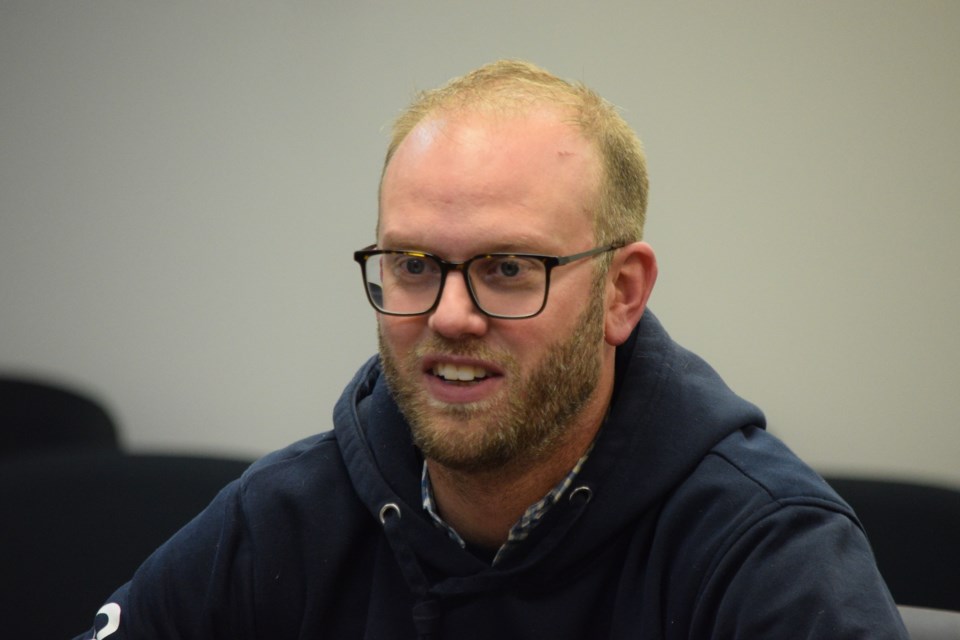BARRHEAD - Recently, Peace River-Westlock Conservative Party of Canada (CPC) MP Arnold Viersen asked his party's new leader Pierre Poilievre, specifically how to pronounce his last name, as many residents in his riding were asking.
Poilievre replied that as long as they marked their X under his party's candidate's name in the next federal election, it did not matter how they pronounced his name.
And as Viersen told Town of Barrhead councillors during their Oct. 12 meeting, the CPC will collect enough of those Xs to form the next federal government.
But until then, Viersen said that Poilievre has made fighting Canada's rising inflation problem his top priority.
"It's something he has been concerned about for a long time, well before he decided to run for the leadership," he said.
Viersen noted how Poilievre sounded the alarm bells as the CPC's finance critic, pointing out the "government was going to continue to throw money into the economy, inflation was going to take off."
"Now he has our party's top job, and he is promising to put your paycheque, retirement and country first by getting inflation under control," he said.
Viersen added that the current government under Justin Trudeau has increased the nation's debt by nearly 500 billion.
"That is more than any other prime minister combined," he said.
Viersen also suggested that increasing Canada's price on carbon tax could not come at a worse time.
He said when the Liberals ran in 2015, they said the carbon tax would be set at $50 per tonne.
"Now they are saying it will go to $170 at some point (by 2030)," Viersen said. "They are making everything you use in your life more expensive. Even the parliamentary budget officer says the carbon tax will have a cascading effect."
He added the CPC has been "working hard" on the energy file to ensure pipelines continue to get built and that Canada takes advantage of its plentiful natural gas reserves in Alberta, Saskatchewan and northern B.C., by converting it into liquefied natural gas (LNG).
"We are uniquely positioned in the world for LNG. We have lots of natural gas, and to turn it into LNG, you need to cool it down a lot, and since we are kind of a cold country, so we have a natural advantage," he said. "Especially against the No. 1 producer of LNG, Australia. You would think it takes more energy in Australia to get it down to -260 Fahrenheit."
Unfortunately, Viersen said, Canada has not been able to capitalize on the resource.
"European leaders are showing up, begging us to get it going, but Trudeau said, 'don't worry, we have hydrogen on the way, it is just 10 years out'," he said.
Viersen added the CPC has also worked hard to get the government to reverse its plans to reduce greenhouse gas emissions associated with fertilizers by 30 per cent below 2020 levels by 2030.
"At a time when more of the world's population is starving, the Trudeau government has decided that we should use less fertilizer," he said, adding that fertilizer use generally triples food production.
Viersen used the example of Sri Lanka, which he said in 2019 banned using synthetic fertilizer so they could sell their crops as organic to fetch better prices.
"What they forgot to calculate in, was without the fertilizer, you only get a third of the product," he said. "They went from being a net exporter of crops like peas and rice and getting money from their exports to go out and buy crops to feed their own people ... so looking at that, maybe we shouldn't be trying stunts like that."
Viersen also noted that farmers do not like buying fertilizer as it is "expensive", which is why they use it as sparingly as possible.
He added that due to the CPC's efforts, the government has now said the 30 per cent fertilizer reduction ban is now only a suggestion.
The "suggestion" that Viersen is referring to are the targets (set out in the Healthy Environment, Healthy Economy document published in December 2020) for less emissions-intensive agriculture. The document commits to the targets previously mentioned from fertilizers by working with fertilizer manufacturers, farmers, provinces, and territories to develop a workable approach.
Another success for the CPC, Viersen pointed to, was the removal of the last COVID-19 cross-border travel restrictions, most notably the need to use the ArriveCan app and the mandatory masking requirement for air travel.
In response to mayor Dave McKenzie asking for his comments on what he perceived as "the Liberal government's continuous attacks against lawful gun owners, Viersen said that as a long-time gun owner himself, he shares his frustration.
He also said the mayor's question was fortuitously timed, as moments before the council meeting, Viersen received a call from Alberta's chief firearms officer, who told him there is a backlog of applications for new firearms licences and renewals along with transfers of gun ownership.
"(The backlog) is pushing 10,000 just in Alberta alone," he said. "They have two people on it. On a good day, they can do 80 applications, so if you are waiting for a transfer or licence renewal, be prepared for a long wait.”
Viersen concluded his 35-minute address by talking about what he perceives as an increase in violent crime.
"It hasn't been a slow rise, it has been happening quickly," he said. "There isn't a clear reason to why that is, but I would make the case that when you change the laws to let everyone out of jail, that sends signals to everyone. It demoralizes police forces and makes recruitment more difficult because there isn't the political support for these institutions."
Barry Kerton, TownandCountryToday.com



